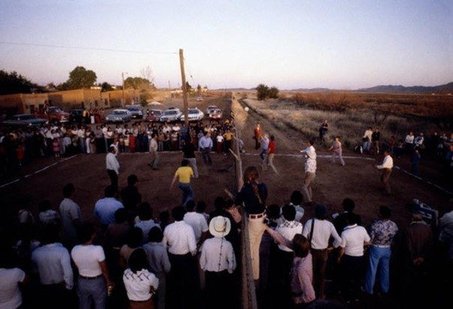Bryan Caplan at EconLog recently pondered why it is that Asians in the US lean Democratic. I suggested in the comments of Bryan’s post that his view — that Asians don’t feel Republicans respect them — seems right, at least to me. I met Bryan for lunch recently, where the topic came up again, and co-blogger Vipul has urged me to elaborate on the subject here.
The important question here, from an open borders standpoint, is how far do immigrants holding undesirable political opinions justify restrictions on their liberty. Secondarily, whether or not undesirable opinions justify immigration restrictions, how much of an actual concern is this for natives, such as political activists hoping to win the votes of immigrants? Specifically, in the US context, is it worthwhile for Republicans to become more “immigrant-friendly”?
We’ve addressed the first question — do undesirable opinions justify immigration restrictions — a fair bit on this site, and we’ll return to it in the future. But for the second, with regard to the US context, my answer is: if Republicans toned down their rhetoric on immigration, and more generally, embraced a less fundamentally white vision of America, they would be much more competitive than they are now.
Bryan’s question about Asian-Americans particularly is interesting because the Republicans quite concretely favour more Asian (high-skilled) immigration, and back policies, such as extension of the H1-B visa, that promote Asian immigration. One hypothesis is that Asian immigrants, who are very well-educated on average, disdain the Republican party’s seeming anti-intellectual/anti-science bent. This seem plausible to me, but I think it’s overlooking the even simpler explanation that Asians feel Republicans don’t fundamentally see them as part of America.
At this point Republicans are up in arms, protesting that they’re not racist. I agree, most Republicans aren’t. I think even Republicans who say insensitive things probably don’t actually harbour much, if any, meaningful prejudice towards the people they’ve insulted (unintentionally in some cases). But the difference between Republicans and Democrats, I think, is not that one group is necessarily less prejudiced than the other. You can be perfectly unprejudiced towards somebody and still see that person as outside your fundamental community or constituency. That, I daresay, is the Republicans’ problem.
It’s difficult to vote for someone whom you believe doesn’t see you as part of their constituency or community. Even if you understand they don’t dislike you on a personal level, that’s a far cry from embracing you and your community as someone to serve, as someone whose interests they care about. In the comments on Bryan’s post, I referred others to this fantastic piece by Muslim baseball blogger Rany Jazyerli, one that starts:
Almost before I knew that I was an American, and almost before I knew that I was a Muslim, I knew that I was a Republican.
It ends:
I look forward to the day, hopefully in the near future, when I once again vote for a Republican candidate… But first, the Republicans have to stop insinuating that I’m alien to this nation. They have to stop implying that I support terrorists. They have to stop accusing me of being anti-American. And they need to denounce anyone in their ranks who does those things. That, I’m afraid, is not negotiable.
Read the whole thing. Rany’s story may be specific to the Muslim community, but to me personally, I think it’s also the story of why Asian and Latino support for the GOP is at pretty much an all-time low. The Asian vote flipped from 48% for Bob Dole in 1996 (versus 43% for Bill Clinton) to 73% for Barack Obama in 2012. Rany cites research by CAIR (a Muslim activist group) which found that Muslim support flipped from 70% for George W. Bush in 2000 to 4% for Mitt Romney in 2012.
Over lunch, Bryan Caplan mentioned that his father’s vision of America includes people like me — people who, as Bryan put it, “dress normally, don’t wear ethnic dress, work at a bank, fit into white society”. The senior Caplan’s vision strikes me as the vision of the Republican party as well. If that’s how you see the US, then of course it’s fine to be suspicious of Muslims’ and other minorities’ loyalties to the US. Of course it’s fine to suspect the sincerity of Barack Obama’s or Nikki Haley’s religious beliefs, and of course it’s fine to joke about them being “ragheads”. Of course it’s fine to make fun of the names these weird people give their children, just as former Virginia governor George “Macaca, or whatever his name is” Allen did.
Republicans at this point rightly retort that Hillary Clinton and Joe Biden make their fair share of racial gaffes too. But I have a hard time believing that a poorly-timed joke about Gandhi segueing directly into lofty praise for the man is at all comparable to calling someone a raghead, or making fun of someone’s culture or name. If the best defence Republicans can muster is that “Democrats are racist too,” that hardly debunks the case that Republicans should be doing more to reach out to immigrant ethnic groups. If anything, it means Republicans could easily stop making insensitive comments and clearly differentiate themselves from Democrats in this regard.
Just compare and contrast the entrenched “give no ground; show no quarter” approach to dealing with Latino-Americans and other immigrants that a current strand of Republican thinking espouses with the approach George W. Bush promoted when he ran for governor of Texas:
Bush has pointedly refused to sign on to his party’s immigrant-bashing agenda. He opposed Wilson over Proposition 187, which withdrew health and public education benefits from illegal immigrants and their children in California.
He’s a strong supporter of Mexico, and he says his warm relations with that country’s leaders have helped him with Hispanic voters. “I’ve talked to a lot of friends who’ll go down to Mexico and they’ll come back and say, ‘God, Bush, you’re really popular in Mexico City,’ ” he says.
Bush gives qualified support to bilingual education, which Wilson and Republican conservatives in Congress have attempted to outlaw. Bilingual education is fine, Bush says, as long as students can pass the state tests he is promoting.
Bush is a vocal opponent of conservative Republican efforts to make English the official language, calling that “a powerful negative message” that repels Hispanic voters.
The natural retort is “And fat lot of good that did George W.” But according to the Pew Research Center, Bush in 2000 cut the Democratic advantage with Latinos from 51 percentage points in 1996 to 27%. In 2004, he reduced it further to 18%. Simply by aggressively building a friendly image with Latinos, George W. Bush reduced the Republican vote deficit among Latinos by 2/3rds. For various reasons, Hispanics may never be a natural stronghold for Republicans, but that doesn’t mean Barack Obama’s mind-blowing 71% of the Hispanic vote in 2012 is the historical norm.
I am not sure if Republicans should hope to return to the halcyon days when they were winning 70% of the Asian or Muslim vote. Certainly I don’t dare claim they can be extremely competitive in the race for the Hispanic vote. There are far too many other confounding issues, such as fundamental policy preferences. But at the same time, it’s difficult to say how competitive the Republicans can be with these ethnic groups when, honestly, George W. Bush aside, they haven’t even been trying.


